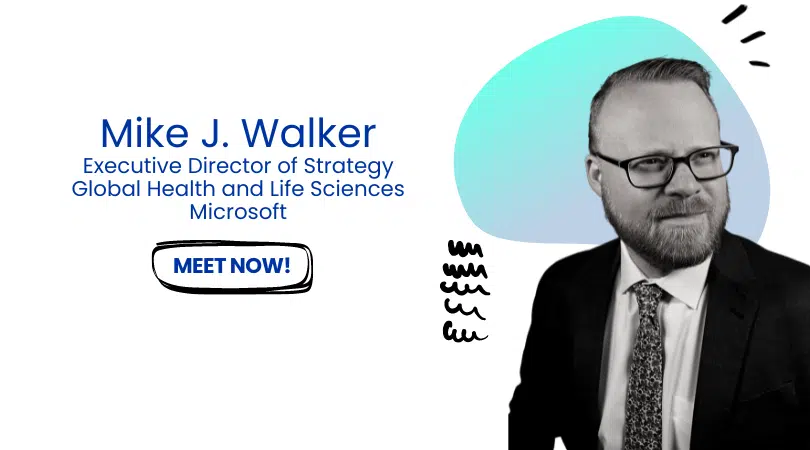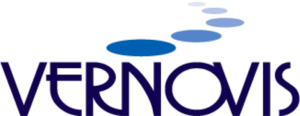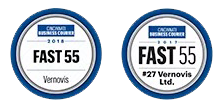Jodi Liscio

You could not sum up Mike J. Walker’s career, interests, and impact in a single word if you tried. To say he is “interesting” would be an understatement. He is part entrepreneur, part digital strategist, and part futurist. Mike is also the Executive Director of Strategy for the Global Health and Life Sciences at Microsoft, where he helps executives navigate the complex web of digital transformation. His expertise in digital business models and emerging technologies like digital ecosystems, industrialized metaverses, advanced AI/ML, and Web 3.0 has made him a sought-after advisor for businesses looking to stay ahead of the curve.
But Mike’s impact goes beyond his role as an executive. He is a prolific thought leader, podcast host, global keynote speaker, and best-selling author whose insights have been featured in numerous books and news outlets, including The Wall Street Journal, Forbes, CNN, and Wired. Previously, Mike worked at Gartner as the Vice President of Technology Innovation Research, where his thought leadership is reflected in over 150 published research notes and over 5,000 client engagements. With his deep understanding of the latest trends and ability to articulate complex ideas simply and engagingly, Mike has guided, inspired, and motivated business executives to stay relevant in the digital economy.
A few interesting things about me that people may not know is that I’m a huge fan of our Cincinnati Reds and Bengals, and I also enjoy the art of slow BBQing on my smoker while sampling local craft beers. Living in Cincinnati does have its perks, with a history of German influence with a rich beer history. Plus, Cincinnati has been rated THE top city for beer drinkers in the United States.
With the time left, I’m spending it practicing my “Dad Joke” routine with my wife, twin boys, and daughter, with varying degrees of success.
From an early age, I was fascinated with technology and gadgets. I can remember being glued to the Commodore 64 and experimenting with BASIC programming. But as I got to high school, my passion for all things tech exploded. This interest can be largely attributed to my computer class teacher, Mr. Siebert. From that point on, I was tenacious about learning the latest and greatest technology trends. When I was just 16 years old, I got my first “real” job working for a start-up, building PCs and servers for local and state government agencies in the evenings after school. Before graduating high school, I was already proficient in assembling computers, networking, and programming in C++ and PowerBuilder.
Since I still loved what I was doing and was continuously learning, this ultimately gave me enormous momentum to jump into the technology field with both feet.
Very simply, choosing the right path. In the late 90s and early 2000s, there were plenty of career options available, and the industry really hadn’t figured them out completely. Most of these areas in the technology field were brand new, and some died a quick and violent death.
To solve this problem, I was lucky to have mentors to guide me through some critical junctures in my career. These mentors taught me to look at the bigger picture and how my choices would lead to what I wanted to do and be over the coming years. One technique I used was to do a bit of “soul searching.” Over several months, I really honed in on what I was passionate about. However, I also realized that passion sometimes isn’t enough, so I looked at my current ability and future potential. Intersecting my passion with my ability gave me the clarity I needed early in my career.
I now use this as a tool that I revisit every few years to re-calibrate myself as I grow and change and as my priorities evolve throughout my career.
One of the most memorable moments was a string of related events that built on each other. It all started when I joined Microsoft in 2006 as the Financial Services Industry Lead, responsible for defining how Microsoft’s products could be used in that set of industries. This work was high profile enough that I was exposed to Bill Gates’ SLT meetings, where I met him one-on-one. I must admit, I was a bit star-struck.
After a few months, I was asked to help provide innovative industry solutions for Bill Gates’s keynote at the Office Developer Conference. To my surprise, Bill Gates selected and showcased much of my work on stage at the event. To have a pioneer in the technology field showcase your stuff was an all-time high!
This led to a wave of exposure that, frankly, I wasn’t used to. Several media outlets (Wired, PC Magazine, CNN, bloggers, and others) were at the event, and all requested interviews to discuss the work that I had done. In the end, nearly 20 articles were written covering my work.
The last big surprise in all of this was that a Microsoft reporter, Mary Jo Foley, had reached out to me and asked if I would be willing to be quoted in her new book, Microsoft 2.0, The Post Gates Era. She wanted to showcase the next wave of leaders after Gates had decided to step down as CEO. Of course, I said yes, but I wasn’t going to hold my breath until I saw my name in black and white. After a few months, I got a package, and there it is, page 123, dedicated to the work I had started just a year prior.
Even if you know what you want in the early stages of your career, be patient and experiment. At this stage of your career, you don’t know what you don’t know. The key things to remember are:
- Always be learning
- Be curious and ask as many questions as possible
- Surround yourself with great people that build you up
- Stay true to yourself, your principles, and your passions
- Get a mentor that can provide meaningful context and career wisdom
- Be proactive in the search for opportunities; never get comfortable
Earlier in my career, I found myself in a few contentious situations with my peers and business partners. Looking back, much of it was a lack of self-awareness or emotional intelligence. I would focus on “the right answer” and defend it because I knew it was the best thing to do. While I was right in many regards in those situations, it didn’t matter much if they felt alienated or threatened. I wasn’t going to get anywhere in that situation.
The then CIO of Fifth Third Bank, Greg Carmichael, pulled me aside one day. He proceeded to tell me, “Listen, I get it, and I see what’s happening here.” Frankly, I didn’t know what to expect as the next words were about to come out of his mouth. He said, “you’re a smart guy thinking five to ten steps ahead of everyone else. I need you to continue doing that, but I need you to do it in a way that makes people feel like they are coming on the journey with you”. I took that in. At the time, it wasn’t completely sticking until he made this quote, “I need you to think strategically, but act tactically.” It all started to come together for me. Yes, while I have the next ten steps mapped out for the final solution, I just need to break this down into consumable steps to make people feel included and bought in.
That advice has been a cornerstone of my personal and working life ever since.
- “Think Again” by Adam Grant is vital in today’s ever-changing world. He not only teaches you how to learn but, maybe even more importantly, to unlearn. Grant also digs into the science behind rethinking. In fact, he argues it’s a necessary skill. In the end, it’s about how we learn, unlearn, and rethink in a fast-changing world.
- “Growth” by Vaclav Smil is a great book about growth in nature and society. I love history and learning from the past to inform the future. Smil does an exceedingly great job at documenting the past and seeing the big picture. While I don’t agree with everything in the book, he is one of my favorite authors for his extremely thought-provoking insights.
- “The Long Game” is one of the best books for long-term career planning. Clarke talks about how we all have the same 24 hours in a day. But with the right strategies, we can become more efficient and powerful in how we use our time.
- “Pivot” is a great book for figuring out what’s next in your career. As a former career development program manager at Google, she reveals how to methodically and strategically make your next career move.
Thank you to Mike for taking the time to be interviewed for our Meet Interesting People series. You can read, listen, and learn more from Mike at some of these places:
- His new book “REWIRE! Using the Digital Ecosystem Playbook to Reinvent Your Business“
- His innovation podcast “V-Next: The Future is Now“
- His articles on Forbes
- Perspectives on Enterprise Architecture on “Mike The Architect” blog




